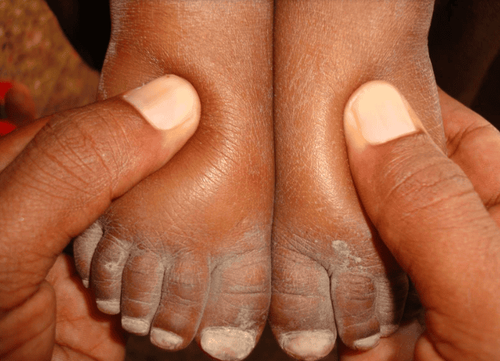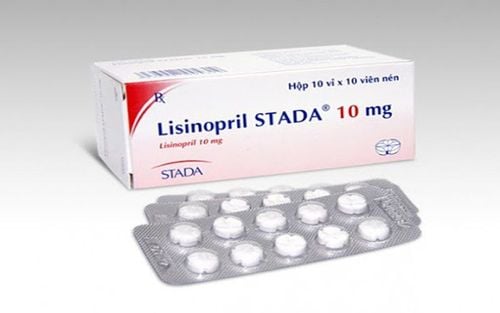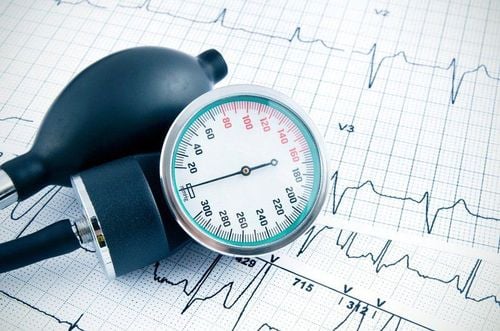This is an automatically translated article.
Acute glomerulonephritis mainly occurs after patients have skin infections caused by streptococci or upper respiratory tract infections. If not treated in time, the disease can turn into chronic glomerulonephritis1. What is acute glomerulonephritis?
Acute glomerulonephritis is diffuse, non-pyretic inflammation in all renal units of the two kidneys. The disease is easy to appear after the patient is exposed to group A streptococcus bacteria (S. Pyogenes), staphylococcus (Staphylococcus), pneumococcal (S. Pneumoniae) or some viruses such as hepatitis B, measles, mumps , chicken pox, ... or parasites.
In addition, the disease can also form because the patient has systemic lupus, inflammation around the microcapillaries, poisoning with heavy metal salts or hypersensitivity to some drugs such as sulphonamides, penicillins,...
2. Symptoms of acute glomerulonephritis
The danger of acute glomerulonephritis is that the disease often progresses silently, without clinical symptoms, so the patient does not know he has the disease (unless it is discovered when going to the doctor for other diseases). However, in some cases, the disease can also develop quite aggressively and the patient should pay special attention when having symptoms such as:
Edema: Patients with acute glomerulonephritis often feel heavy in the face, two swollen eyelids, swollen legs (especially around the ankles). Patients often have a lot of edema in the morning, and in the evening, the edema will decrease. However, this sign is usually only seen in the first 10 days and disappears quickly when the patient urinates a lot. Frequent urination is a sign that the patient is beginning to recover: reduced edema, lower blood pressure, feeling lighter, eating better. Blood in the urine: The patient has blood in the urine, the urine is cloudy red. The patient will have blood in the urine 1-2 times a day. This symptom usually appears in the first week of illness and can recur after 2-3 weeks. After that, the number of times of blood in the urine gradually became less frequent, once every 3-4 days and then completely gone. This sign does not affect the general condition of the body but can cause anemia in acute glomerulonephritis. Oliguria (oliguria, anuria): The patient has little urine output, urine output is less than 500ml/day, is common in the first week of the disease and lasts for 3-4 days, does not increase urea and creatinine in the blood. or insignificant increase. Oliguria may recur in the following 2-3 weeks. Changes in urine: The patient's urine is yellow, small in volume, with proteinuria (protein in the urine). Hypertension: A common symptom, accounting for 50% of cases of acute glomerulonephritis. Hypertension in children with the disease is 140/90 mmHg and in adults is 160/90 mmHg. Some cases have paroxysmal hypertension and persist for many days with a blood pressure of about 180/100 mmHg. Other symptoms: Mild fever (37.5 - 38.5oC), kidney pain, renal colic, abdominal pain, mild abdominal distension, loss of appetite, nausea, loose stools,...

Viêm cầu thận cấp thường gây phù 2 chân
3. Complications of acute glomerulonephritis
If not detected and treated in time, the patient can face the consequences of acute glomerulonephritis extremely seriously. Those are complications:
Some cases of severe edema can cause systemic edema causing pleural effusion, peritoneal effusion, acute pulmonary edema, ... life-threatening. When hypertensive crisis occurs, the patient may have a stroke or acute cerebral edema or high blood pressure encephalopathy, manifested by headache, nausea and vomiting, dizziness, blurred vision, and possibly coma, convulsions. convulsions and can lead to death. Some cases have acute renal failure, oliguria or prolonged anuria, increased blood urea and creatinine. If acute renal failure recurs for many episodes, it can lead to rapidly progressive glomerulonephritis, chronic glomerulonephritis,... Heart failure: Often accompanied by paroxysmal hypertension due to sudden increase in circulating volume and with may be due to cardiomyopathy in acute glomerulonephritis. People with acute heart failure present with shortness of breath, inability to lie down, which can lead to pulmonary edema (severe dyspnea, diaphoresis, rapid and shallow breathing, retraction of the supraclavicular pit, suprasternal pit, and space retraction. intercostal), coughs and spits up pink foam. If not treated in time, the patient will die.
4. Principles of prevention and treatment of acute glomerulonephritis

Viêm cầu thận cấp có thể khỏi hoàn toàn từ 90 - 95% nếu được phát hiện sớm và điều trị tích cực.
4.1. Principles of prevention Acute glomerulonephritis is common in children 3-8 years old, boys are more common than girls with a ratio of 2:1. Therefore, parents should not be subjective when children are sick. When the child has signs of respiratory infection, skin infection or symptoms of glomerulonephritis, parents should take the child to a medical facility for examination and strictly follow the indications for treatment to quickly recover from the disease. Observe the principles of hygiene in eating and living. It is necessary to clean the throat and mouth daily by gargling after eating, before going to bed and after waking up. Clean the body by bathing daily, avoiding acne, boils, impetigo,... In the cold season, keep your neck warm, don't drink too cold water. Avoid contact with sick people. Patients need to limit salt intake because it is easy to cause edema. When there are signs of kidney failure, patients need to reduce protein and potassium in the diet and rest absolutely when having high blood pressure. 4.2. Principles of Treatment Treat the underlying cause of the infection with antibiotics. Treatment of symptoms: fever, edema, hypertension with drugs prescribed by a specialist. The cases after being cured of acute glomerulonephritis need to periodically check the kidney function as prescribed by the doctor.
Please dial HOTLINE for more information or register for an appointment HERE. Download MyVinmec app to make appointments faster and to manage your bookings easily.













